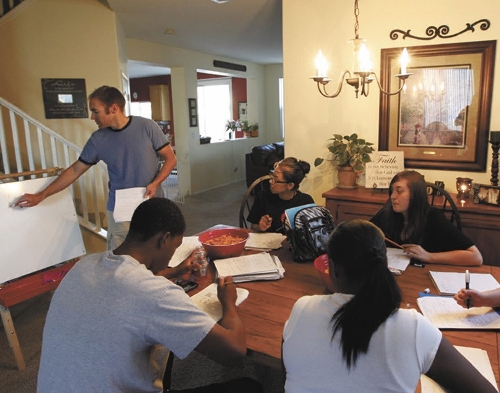Part-time teaching online pays off

Teachers have been known to make a few extra bucks by delivering pizza or hawking peanuts at the ballpark.
These days, students might just as easily find their teachers working online.
High school students at the Northwest Career and Technical Academy, for instance, could find their math teacher Mark Jimenez if they happen to take online courses from Beacon Academy of Nevada, the Nevada Virtual Academy, Virtual High School, Kaplan University, the University of Phoenix or Concordia University in Portland.
Jimenez, 33, is beating the high cost of living by teaching for five to six online schools a year while also maintaining his day job as a full-time instructor for the Clark County School District.
The part-time online teaching jobs have increased his income by two-thirds of his regular salary, which is $60,000, and pushed him into a higher income tax bracket, he said.
But Jimenez, who supports a wife and four daughters, still finds it difficult to stay ahead of the bills.
“There’s always something. My 8-year-old needs braces. A tire goes flat,” he said. “As soon as you save some money, you have to spend some money.”
WORK HISTORY
Jimenez said he has never been afraid of work. He put himself through college by working construction, helping build the New York-New York and Bellagio casinos.
As a teacher, he thought he would have to go back to construction in 2008 when the decline in the real estate market forced him to discontinue a side business of restoring and reselling homes.
When looking for ways to supplement his income, he found a newspaper advertisement for an online charter school in need of a math teacher.
One job led to another. Because of the scarcity of math teachers, Jimenez soon found himself in great demand.
Sean Jensen, the high school principal of the Nevada Virtual Academy, said he would rather not hire teachers who work for competing online charter schools.
“If I am desperate and I need a teacher, it’s something I can overlook,” said Jensen, especially if he is hiring someone part time.
Because Jimenez finished a doctorate in education, he also has begun teaching college level classes in education.
A spokeswoman for Kaplan University said they like to hire people working in the field for the real-world experience they bring to the classroom.
ONLINE WORKLOAD
While the college level courses involve more essays and papers to grade, Jimenez said the online high school math classes are actually more difficult to teach.
For an online charter school to maintain its public funding, it must prove student attendance by showing weekly contact with its students. Charter schools receive public funding based on their enrollment but are privately managed.
If students stop handing in assignments or responding to emails, Jimenez must track them down.
“You drive by their house, call their parents,” he said.
The quirkiness of online high school education is that the students seem to come from the two extremes, those on the verge of dropping out or the high achievers looking to get ahead.
During the school year, Jimenez said he will answer between 50 to 100 emails a day. He rises before 5 a.m. each day to stay on the top of the workload. He arranges his “live sessions,” or real-time class instruction, for the afternoon when his regular job is over.
The hard part of teaching a live session online is making sure that students are paying attention. For all he knows, a student could have opened another browser and be following the sports scores on ESPN.com during his lecture. So he tries to call on students as much as possible.
Some parts of the job are getting easier. If Jimenez suspects plagiarism, there are websites that will check papers to see if they have been produced elsewhere on the Internet.
Because of the demands on online instructors, many don’t succeed, said Michael Opp, the principal of Beacon Academy of Nevada.
“We have not rehired about 30 percent of the teachers that start with us,” Opp said. “All of them genuinely cared about students, but misjudged the amount of time required to adequately serve our students.”
STUDENT FEEDBACK
Two of his students from Northwest Career and Technical Academy, Elizabeth Molina, 18, and Cassie Marie Lemos, 17, described Jimenez as an entertaining teacher who takes time to get to know his students.
“He’s funny. I always look forward to his class,” Molina said.
Both students were unaware of his extra workload. “He never seems tired,” Molina said.
But Jimenez said he feels like “I’m always working, even when I am not working, I am thinking about tomorrow, I have this live session, I have to grade these papers, make these assignments, talk to this student. There’s always something coming up next.
“I keep telling myself next year I won’t do as much. Hopefully, one of these days I will get the credit card paid off. I won’t have to do so many jobs.”
Contact reporter James Haug at jhaug
@reviewjournal.com or 702-374-7917.